Going beyond books
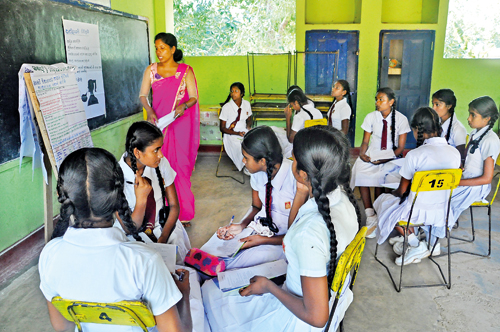
A rural school in Wahalkada, Kebithigollawa: After school lessons focussing on life skills and soft skills. Pix by Nilan Maligaspe
Close to a two-hour drive from Anuradhapura, off the town of Kebithigollawa is the small school of Wahalkada D2. We reach there a little after the school day has finished, but for a group of 12 students, lessons are still not over. This is no ordinary lesson focused on geography or mathematics. Instead it focuses on an area the national school curriculum fails to look at – life skills and soft skills.
For that day’s lesson, the teacher known as a “social mobilizer”, teaches time management and how to effectively prepare a study timetable for the upcoming exams as well as getting each child to volunteer to tutor another student in their preferred subjects. The children are told to account for family functions, unexpected events and even rest times.
It all sounds simple enough, almost common sense, but the effects are far-reaching. When we visit 14-year-old Piyumi Sandamalie’s home, a small unplastered house, Piyumi’s mother eagerly tells us how the programme has changed her daughter’s life. “She’s become more patient now, and will go out of her way to help others,” she says, reiterating how her daughter teaches the neighbourhood children in spite of it eating into her own study time. Though naturally talented in writing and dancing it wasn’t until she took part in the girls’ education programme that her confidence blossomed and she started actively participating in competitions. This once shy girl is not only excelling at school, but making a positive impact both at home and in her community.
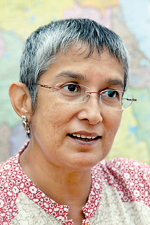
Shevanthi Jayasuriya: “We’re transforming lives”. Pic by Priyantha Wickramaarachchi
Her story may not sound that special until you realize the challenges faced by most women in rural underprivileged areas. Country Director for Room to Read in Sri Lanka, Shevanthi Jayasuriya explains how girls from rural communities are more likely to become pregnant as teens, be married off at young ages, become victims of abuse and be trapped in the poverty cycle. “Some women try to escape this cycle by going abroad as domestic aides, but only 20% of them are actually better off than when they left,” she says adding that most women suffer some sort of abuse or hardship as a result of their employment and that the rate of incestual abuse increases in households without mothers.
The girls’ education programme that had been operating in the school since 2011 is an initiative by the international charity “Room to Read” (RTR). Its aims are twofold: first, to ensure that the girls complete their secondary schooling and second, that they gain the necessary skills to negotiate key life decisions. Starting from Grade 6 up until Grade 12, the programme covers a variety of areas from decision making, empathy, sexual health and reproduction, career planning, financial literacy to building healthy relationships and avoiding abusive ones.
The programmes are conducted by the social mobilizer – usually a person from the area who acts as a mentor to the girls and liaison between the community and the programme. These social mobilizers must constantly monitor the progress and attendance of the girls: if a child is absent for three days consecutively they visit her home to check up on her. This has helped prevent countless drop-outs. In most instances these social mobilizers form a great rapport with the children and can reach out to them in a way parents cannot.
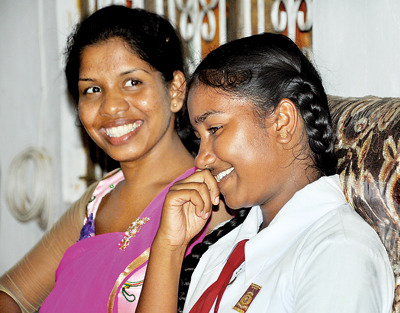
Close bond:15-year-old Sachini Nimesha Tillekaratne with her social mobilizer
We saw this with 15-year-old Sachini Nimesha Tillekaratne. Though a little shy around strangers we got to witness how bubbly and enthusiastic she was with the social mobilizer who is both her mentor and confidante. Her mother comments that it eases her mind to know that her child has someone to always connect with. “She can’t always open up to me because I’m her mother, but she can always talk to her (the social mobilizer),” she adds.
“We’re engaged in transformative work. We’re transforming lives,” say Shevanthi speaking about the programme, which operates in schools across Moneragala, Badulla, Matale, Anuradhapura and Kandy. The results speak for themselves. 95% of the first batch of girls to follow the programme at a school in Hatton have graduated and are either in higher education, vocational training or employed. Two students from an IDP camp school in Puttalam entered the Colombo and Peradeniya Law Faculties.
“Self-respect and self-worth isn’t taught in the system,” says Shevanthi, referring to both the cultural and education systems. By teaching these girls these values, and teaching them to dream bigger and aim higher, “hopefully critical mass is created by the time we leave and the girls become role models to look up to in their community.”
However, the work done by Room to Read doesn’t just focus on girls’ education nor is it limited to Sri Lanka. A global charity, Room to Read, which operates in 14 countries, spanning from Nepal to South Africa, seeks to transform the lives of children through capacity building by focusing on literacy and gender equality. Already RTR has reached over 10 million children across the world with its literacy and girls’ education programmes, and hopes to reach over 15 million by 2020.
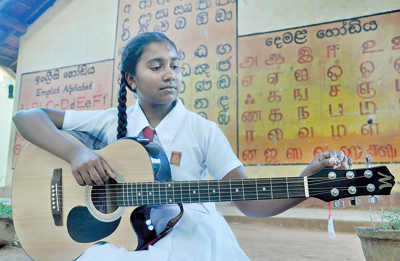
Aspiring musician: Sachini trying her new guitar
The organization which was founded by former Microsoft executive John Wood, former Goldman Sachs executive Erin Ganju, and Dinesh Sheshtra, had its beginnings in a chance encounter back in 1998. While trekking in Nepal, Wood met a Nepalese school inspector who invited him to visit one of the local schools.
On seeing the meagre collection of books that formed the school’s library, Wood was moved. Immediately contacting his associates and acquaintances asking for books, Wood was able to construct a worthy library for the school’s 450 odd students. From there on Wood quit his job and started ‘Books for Nepal’, which went on to become Room to Read.
Today its literacy programme has expanded its operations from merely procuring books and building libraries to publishing children’s books in the local languages and training primary school teachers on effectively teaching languages. In fact now the organization is said to be one of the most influential children’s publishers in the region, having won the 2011 UNESCO Confucius Prize for Literacy. This vertical integration into publishing was spurred due to the lack of quality, age appropriate as well as culturally relevant books in local languages available in the local markets. “Today we train the local authors and illustrators on how exactly to write for children,” explains Shevanthi, adding that the books are then published in-house and distributed free of charge to school libraries.
But the programme which perhaps has had the biggest impact is the primary teacher training programmes. Piloted in 2012 and launched in 2014, the programme which works through the zonal education system trains primary school teachers in the evidence based methodology for teaching language, especially the mother tongues, replacing the outdated rote learning which focuses on memorisation rather than comprehension. “Over 70% of students that sit for the grade 5 scholarship receive a zero for the essay question,” says Shevanthi, explaining that this shows a lack of comprehension. “You can’t do other subjects without basic language skills,” she adds highlighting the importance of children grasping the basics of language at an early age.
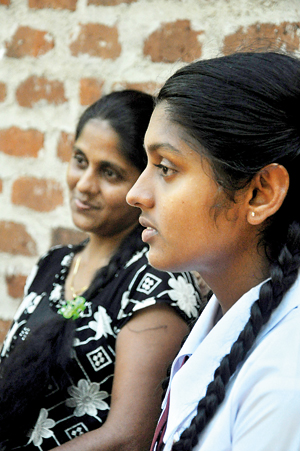
14-year-old Piyumi Sandamalie with her mother
Under the new methodology teachers use ‘nonsense words’ (fictional words) to assess whether the kids are merely memorising or whether they comprehend the rules of language; as well as the scientific method of measuring reading speed. In addition they’re trained in the art of storytelling and use various reading techniques such as loud, shared and paired reading. Teachers can now identify the reading abilities and level of each child and cater to them individually according to RTR. For most schools the results become apparent after the grade 5 scholarship exam, says Shevanthi. But within the first few months itself there is a decrease in teacher absenteeism as teachers are more enthusiastic when they see the progress of a child that comes with each lesson. “We’ve had teachers say that for the first time in their 25 years of teaching, they’re enjoying their vocation,” says Shevanthi.
Their literacy programmes have also resulted in parents and the community becoming more involved in their children’s education. “Once parents see the child’s progress their interest levels shoot up,” Shevanthi says, mentioning how in some instances the child who is in Grade 1 or 2 reads the newspaper to their own parents. The community also gets involved through the library system. This is because even though the school libraries are built by RTR, it is the parents who manage them. This helps to make the entire system more sustainable as the community buys into the concept.
Ultimately the goal of their literacy programmes is to give children the necessary literacy skills to further their studies, as well as create the habit and foster a love for reading. As perhaps best said by the famous children’s book author, Dr. Seuss, “The more that you read, the more things you will know. The more that you learn, the more places you’ll go.” That is what RTR strives for, the transformation of lives through education.
Currently their literacy programme in Sri Lanka operates in Vavuniya, Polonnaruwa, Badulla and Anuradhapura, in over 200 schools.These programmes along with the girls’ education programmes are funded by various individual and corporate donations from across the world, while the biggest corporate support here has been Hong Kong and Shanghai Banking Corporation (HSBC), which has helped RTR to carry out its work across the island, and especially in the most remote rural areas that especially need this leg up to break the cycle of poverty.


